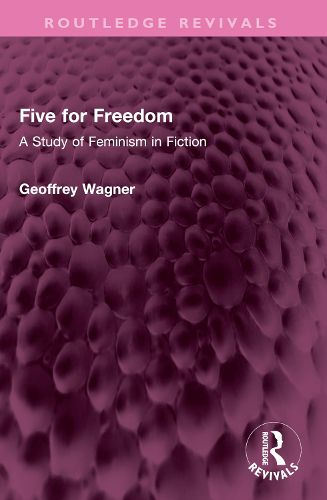Readings Newsletter
Become a Readings Member to make your shopping experience even easier.
Sign in or sign up for free!
You’re not far away from qualifying for FREE standard shipping within Australia
You’ve qualified for FREE standard shipping within Australia
The cart is loading…






First published in 1972 Five for Freedom is a candid study of five European fictional heroines as anticipatory of contemporary feminism: Madame de Merteuil of Choderlos de Laclos' Les Liaisons dangereuses, Jane Eyre, Emma Bovary, Tess of the D'Urbervilles, and Tony Buddenbrook. Professor Wagner clearly believes that, in the first place, the role of women in the development of fiction has been underestimated, while the claims to originality of many recent female liberationists have been equally overestimated.
This is a far-ranging, lightly-handled book with insights into both mode of fiction, as it developed and answered women's demands, and into the role of some of its leading heroines; for Professor Wagner's studies do not limit themselves strictly to the 'five for freedom' but foray into Balzac's Cousine Bette, Catherine Earnshaw of Wuthering Heights, Anna Karenina, and Eca de Queiroz's Portuguese Bovary in Cousin Bazilio. This brilliant little study is topical, readable, yet learned. It will be useful for scholars and researchers of literature, Women's studies, and Gender studies.
$9.00 standard shipping within Australia
FREE standard shipping within Australia for orders over $100.00
Express & International shipping calculated at checkout
Stock availability can be subject to change without notice. We recommend calling the shop or contacting our online team to check availability of low stock items. Please see our Shopping Online page for more details.
First published in 1972 Five for Freedom is a candid study of five European fictional heroines as anticipatory of contemporary feminism: Madame de Merteuil of Choderlos de Laclos' Les Liaisons dangereuses, Jane Eyre, Emma Bovary, Tess of the D'Urbervilles, and Tony Buddenbrook. Professor Wagner clearly believes that, in the first place, the role of women in the development of fiction has been underestimated, while the claims to originality of many recent female liberationists have been equally overestimated.
This is a far-ranging, lightly-handled book with insights into both mode of fiction, as it developed and answered women's demands, and into the role of some of its leading heroines; for Professor Wagner's studies do not limit themselves strictly to the 'five for freedom' but foray into Balzac's Cousine Bette, Catherine Earnshaw of Wuthering Heights, Anna Karenina, and Eca de Queiroz's Portuguese Bovary in Cousin Bazilio. This brilliant little study is topical, readable, yet learned. It will be useful for scholars and researchers of literature, Women's studies, and Gender studies.